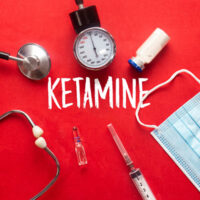Is Medical Ketamine The New Medical Cannabis?

Thirty years ago, Dr. Dre’s The Chronic blasted from the stereo system of every car where the air inside the vehicle was noticeably thicker than the air outside the vehicle. During boring classes, high school students would doodle pot leaves in their notebooks and write “legalize it” in stylized letters. Elsewhere, old friends in tie-dyed T-shirts and graying ponytails would pass a joint around the living room and lament that the 420 friendly dreams of their youth never came to fruition. In 1993, the phrase “medical marijuana” was a punchline or a remote aspiration, but now you can legally buy medical cannabis in Pennsylvania, and some cities have decriminalized possession of small quantities of cannabis for personal recreational use. Now it appears that ketamine is having its moment. For every Pennsylvanian who thinks that ketamine is just another fad drug that causes slovenly teenagers to gibber like minions, there is one who finds ketamine to be at least as effective a treatment for depression and other mental illnesses as some other commonly prescribed psychiatric medications. If you are facing criminal charges for illegal possession of ketamine, contact a Pittsburgh drug crime lawyer.
Pennsylvania Ketamine Laws
Ketamine is a Schedule III controlled substance, which means that it is commonly used in a medical setting but that its potential for misuse outside a medical setting is considerable. Its officially accepted medical use is for anesthesia, because it causes sedation, pain relief, and a dissociative trance-like state, but it does not lower heart rate and respiration like some other anesthesia drugs do.
It is the dissociative effects of ketamine that have made it popular as a recreational drug. In a medical setting, ketamine is most often administered intravenously, but in recreational use, it can be mixed with other powders and snorted or added to tobacco or cannabis and smoked. The effects of ketamine last less than one hour.
In the News
Within the medical community, ketamine has been gaining a following as a treatment for several notoriously difficult to manage conditions, such as chronic pain, clinical depression, and post-traumatic stress disorder (PTSD). Pennsylvania has several ketamine clinics where doctors administer patients intravenously and guide them through a psychedelic experience in an outpatient setting.
Studies have also investigated the promise of ketamine as a treatment for substance use disorder. The current edition of the journal Addiction includes a study by researchers at Case Western Reserve University in which they showed that ketamine therapy helps patients with cocaine use disorder abstain from using cocaine. It could be more effective at treating cocaine use disorder than the currently available medication therapies, such as antidepressants and stimulants.
Contact Gary E. Gerson About Drug Crimes
Even though Schedule III controlled substances are legal in certain settings, you can still face felony charges for illegal possession of them. A criminal defense lawyer can help you if you are facing criminal charges for possession of ketamine or other drugs. Contact the law offices of Gary E. Gerson in Pittsburgh, Pennsylvania about your case.
Sources:
dea.gov/sites/default/files/2020-06/Ketamine-2020.pdf
neurosciencenews.com/addiction-ketamine-treatment-22532/
mindbloom.com/?utm_source=adwords&utm_medium=cpc&utm_campaign=PM_ACQ_Search_Purchases_NB_Broad_01.2022&utm_device=c&utm_content=634202295349&gclid=CjwKCAiAr4GgBhBFEiwAgwORrV7Nx_V7sqWZx6TWGuEqJU74NltvqwmO58d3xdDPiwM9CxYAlvpLpxoCXccQAvD_BwE


